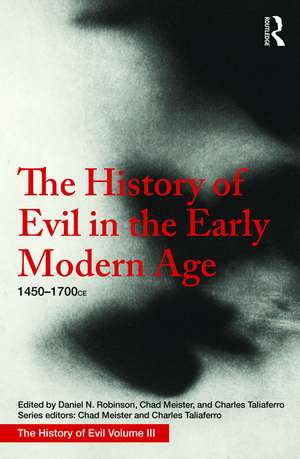The History of Evil in the Early Modern Age: 1450–1700 CE: History of Evil
Autor Daniel Robinsonen Limba Engleză Hardback – 19 iun 2018
This superb treatment of the history of evil during a formative period of the early modern era will appeal to those with interests in philosophy, theology, social and political history, and the history of ideas.
Preț: 1005.17 lei
Preț vechi: 1225.81 lei
-18% Nou
Puncte Express: 1508
Preț estimativ în valută:
192.40€ • 209.06$ • 161.72£
192.40€ • 209.06$ • 161.72£
Carte tipărită la comandă
Livrare economică 21 aprilie-05 mai
Preluare comenzi: 021 569.72.76
Specificații
ISBN-13: 9781138236820
ISBN-10: 1138236829
Pagini: 320
Dimensiuni: 156 x 234 x 19 mm
Greutate: 0.59 kg
Ediția:1
Editura: Taylor & Francis
Colecția Routledge
Seria History of Evil
Locul publicării:Oxford, United Kingdom
ISBN-10: 1138236829
Pagini: 320
Dimensiuni: 156 x 234 x 19 mm
Greutate: 0.59 kg
Ediția:1
Editura: Taylor & Francis
Colecția Routledge
Seria History of Evil
Locul publicării:Oxford, United Kingdom
Public țintă
UndergraduateCuprins
Editors and contributors
Series Introduction
Introduction
Daniel Robinson
1. Towards a History of Evil: Inquisition and Fear in the Medieval West
Teofilo F. Ruiz
2. Witchcraft
Daniel Robinson
3. Medicine
Daniel Robinson
4. Magic and the Sciences during an Age of Change
Peter Maxwell-Stuart
5. Niccolò Machiavelli
Cary J. Nederman and Guillaume Bogiaris
6. Luther
Jennifer Hockenbery Dragseth
7. John Calvin on Evil
Paul Helm
8. Evil within and Evil without: Teresa of Avila Battles the Devil
Bárbara Mujica
9. Anabaptists
Gerald J. Mast
10. Francis Bacon
John Henry
11. Shakespeare and Evil
Claire Landis
12. Hobbes and Evil
Geoffrey Gorham
13. Descartes on Evil
Zbigniew Janowski
14. Milton
Dennis Danielson
15. Baruch Spinoza on Evil
Eugene Marshall
16. Gottfried Wilhelm Leibniz
Marcy P. Lascano
17. Cambridge Platonism
Charles Taliaferro
18. Indigenous Peoples
Kenneth H. Lokensgard
19. Religious Authority and Power: Rituals of Conflict in Africa
Bala Saho
20. Representations
Charles Taliaferro and Jil Evans
Index
Series Introduction
Introduction
Daniel Robinson
1. Towards a History of Evil: Inquisition and Fear in the Medieval West
Teofilo F. Ruiz
2. Witchcraft
Daniel Robinson
3. Medicine
Daniel Robinson
4. Magic and the Sciences during an Age of Change
Peter Maxwell-Stuart
5. Niccolò Machiavelli
Cary J. Nederman and Guillaume Bogiaris
6. Luther
Jennifer Hockenbery Dragseth
7. John Calvin on Evil
Paul Helm
8. Evil within and Evil without: Teresa of Avila Battles the Devil
Bárbara Mujica
9. Anabaptists
Gerald J. Mast
10. Francis Bacon
John Henry
11. Shakespeare and Evil
Claire Landis
12. Hobbes and Evil
Geoffrey Gorham
13. Descartes on Evil
Zbigniew Janowski
14. Milton
Dennis Danielson
15. Baruch Spinoza on Evil
Eugene Marshall
16. Gottfried Wilhelm Leibniz
Marcy P. Lascano
17. Cambridge Platonism
Charles Taliaferro
18. Indigenous Peoples
Kenneth H. Lokensgard
19. Religious Authority and Power: Rituals of Conflict in Africa
Bala Saho
20. Representations
Charles Taliaferro and Jil Evans
Index
Notă biografică
Daniel Robinson is Distinguished Professor Emeritus of Philosophy at Georgetown University, USA and a Fellow of the Faculty of Philosophy, Oxford University, UK.
Chad Meister is Professor of Philosophy and Theology at Bethel College, USA.
Charles Taliaferro is Professor of Philosophy at St Olaf College, USA.
Chad Meister is Professor of Philosophy and Theology at Bethel College, USA.
Charles Taliaferro is Professor of Philosophy at St Olaf College, USA.
Recenzii
This excellent collection provides a road map for those interested in studying the concept of evil in early modern culture. Evil for whom, one might ask? Evil according to what creed, and in what circumstance? Such questions animate the book’s principal aim, which is to show the period’s wide variety of perspectives on the subject, from the intensely theological to the profoundly secular, from the Devil to Thomas Hobbes. The volume is easy to recommend for its depth and vitality, and—too—because the editors allow room for the possibility that evil is not solely a historical phenomenon. Ryan Stark, Corban University, USA
Descriere
The third volume of The History of Evil encompasses the early modern era from 1450–1700. This revolutionary period exhibited immense change in both secular knowledge and sacred understanding. It saw the fall of Constantinople and the rise of religious violence, the burning of witches and the drowning of Anabaptists, the ill treatment of indigenous peoples from Africa to the Americas, the reframing of formal authorities in religion, philosophy, and science, and it produced profound reflection on good and evil in the genius of Shakespeare, Milton, Bacon, Teresa of Avila, and the Cambridge Platonists.





